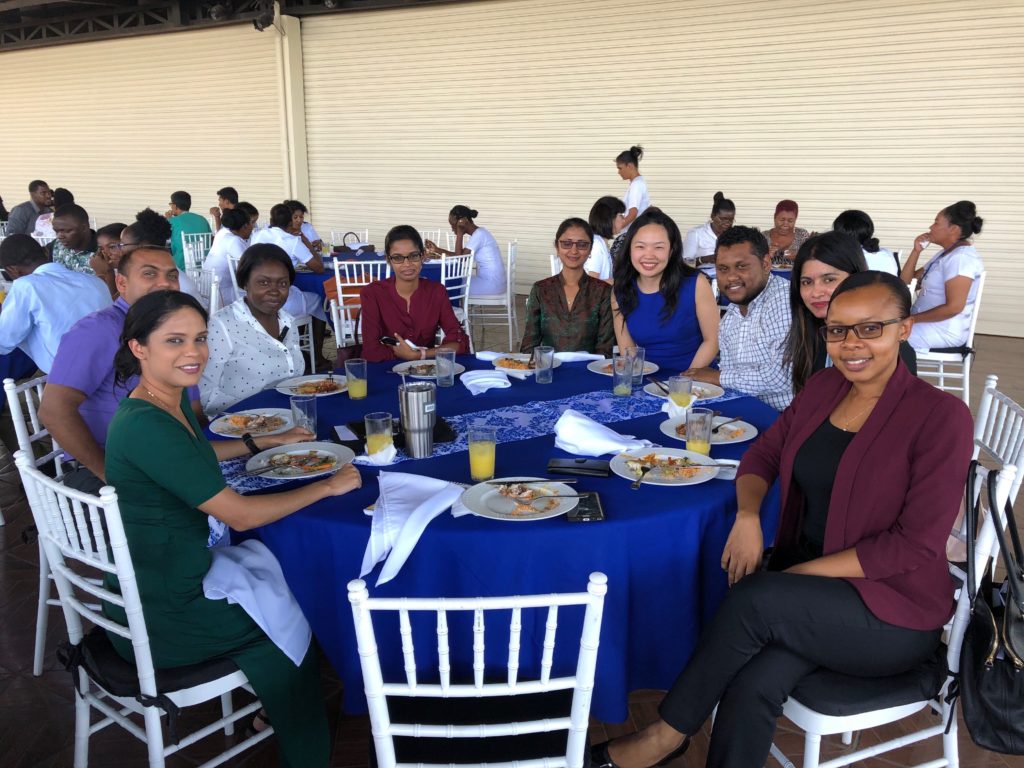
McMaster Children’s Hospital brings patient safety initiative beyond borders
Patients and families should receive safe, high quality care, no matter where in the world they live. That’s the motivation behind McMaster Pediatrics Global Quality Improvement and Patient Safety (QIPS) initiative, which enables a team of McMaster Children’s Hospital (MCH) patient safety leaders to travel abroad and share their expertise with children’s hospitals around the world.
The QIPS initiative was started by Dr. Madan Roy, general pediatrician at MCH, and Dr. April Kam, emergency physician at MCH. “We are both passionate about patient safety and quality improvement,” says Dr. Kam. “Dr. Roy knew I had an interest in global health education.” From there, the pair connected with physicians and nurses they knew both abroad and at MCH.
The group’s first trip was to Mumbai, India in 2017. Since then, they have visited Pune (India), Georgetown (Guyana), and Singapore (Singapore) with more plans for 2020.
Partnering with global institutions
Leaders in host countries work closely with the MCH team to identify local needs. Then, a program is developed for the healthcare professionals abroad, where resourcing may be scarce and concepts are new. Participants come from an array of backgrounds, including pharmacists, laboratory technicians, physicians, nurses, and administrators.
The patient safety experts from MCH prepare interactive workshops, consultations, lectures, hands-on teaching of practical tools, and case studies to share with the host hospital. Typically, a group of 4-6 professionals including doctors, nurses, and other specialties travel to the host hospital.
They teach on topics including creating a positive patient safety culture, reducing diagnostic errors, improving medication safety, establishing safe and structured handovers between different providers, and how to lead in times of change.
The conferences are funded by a variety of sources, depending on the destination, including host hospitals in kind-contribution, self-funding by physicians, and the Joyce Centre for Healthcare Innovation, which supports healthcare leaders, learners and researchers to improve patient safety through innovation.
“This initiative provides the opportunity to share our expertise and passion for patient safety,” says Dr. Fitzgerald, who was president of MCH when the initiative began. “It enriches both the staff at the hospitals we visit and our own HHS staff.”
Dr. Fitzgerald was able to participate as a member of the team in Mumbai and Singapore. He taught groups on surgical safety, the importance of leaders and their role in patient safety, and led a workshop on Hamilton Health Sciences’ continuous quality improvement (CQI) initiative and patient safety huddles.
The impact
“Three sites were provided with one year post workshop surveys, and their follow-up data revealed there have been tangible changes to the local hospital since the initial workshop and conference,” says Dr. Kam.
Surveys indicate respondents have changed their perception on suggesting changes in the workplace. They feel very confident to identify factors that could play a role in patient safety in their workplace. They also feel like they could successfully use the tools presented and feel more prepared to carry out a quality improvement and patient safety project. Many wished to have further in-person training and online support.
Dr. Neil Castellino, a pediatric intensivist at Surya Hospital in Mumbai, says the results were sobering when the hospital first started measuring and reporting their incidents.
“Everyone realized that a lot more needs to be done,” he says. “The workshops started us on the journey and opened our eyes to the magnitude of the problem and the great responsibility we have to ensure primum non nocere,” a Latin phrase meaning, first, do no harm. Since MCH’s visit to Mumbai, Dr. Castellino has visited the Hamilton hospital to observe patient safety measures in action.
The group plans to expand to other hospitals. They are visiting Jaipur, India in February 2020 and Antigua in July 2020.
“We’re engaging, empowering and enabling our staff to be global leaders and innovators for the benefit of both our community and the world,” says Dr. Kam. “It’s an amazing thing to be given the opportunity to educate and collaborate in order to improve patient safety and quality care.”
